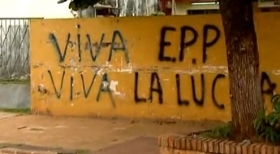A recently released hostage of Paraguayan guerrilla group the EPP says his captors boasted about their links to Colombia, Venezuela and Cuba. This adds weight to the small-time group’s claim to be a full-fledged insurgency.
Farmer Fidel Zavala was released in January after being held by the Paraguayan People’s Army (Ejercito del Pueblo Paraguayo – EPP) for more than three months. In his first statement to the press, he said that while he was in captivity he had heard the guerrillas boasting about having received training in Venezuela, Colombia, and Cuba.
The guerrillas talked about President Hugo Chavez as a hero, and bragged about how easily they could buy cheap weapons in Venezuela, according to Zavala. He also said his captors used Colombian terms in conversation, making their claim to have spent time in Colombian training camps more plausible.
While much of this could be dismissed as bravado from a fairly weak guerrilla group, claims have been surfacing for many years linking the EPP to Venezuela and Colombia, specifically to the Revolutionary Armed Forces of Colombia (Fuerzas Armadas Revolucionarias de Colombia – FARC).
In April 2010 a Paraguayan prosecutor said there was evidence that the links between the FARC and the EPP went back at least a decade, before the EPP was even active under its current name.
It appears that much of this contact involves military aid from the FARC to its Paraguayan counterpart. Based in part on documents found on the computer hard disks of FARC commander alias “Raul Reyes,” the official stated that the FARC had sent advisers to Paraguay, and had trained Paraguayan guerrillas in Colombian camps. She also asserted that a number of recent kidnappings in her country appeared to follow the methods of the Colombian guerrillas, and that the FARC had claimed a 30 percent share of the proceeds of one notorious 2001 kidnapping case carried out by a group that would later become the EPP.
The Colombian government warned in June 2006 that the FARC could be training Paraguayans in kidnapping techniques and the use of explosives, while Paraguay’s prosecutor general said in the same month that the authorities suspected that there were FARC operatives active in the country.
The EPP’s reported boasts of links with Venezuela also have precedents. In June 2010 the Paraguayan press published photos found in an EPP camp, which apparently showed a suspected militant, thought to be the EPP’s main contact with Venezuela, in the company of Paraguayan and Venezuelan officials including Chavez’s Foreign Minister Nicolas Maduro.
If true, these well-established foreign connections would suggest that the EPP has some political weight as an insurgent group — something that has been questioned in Paraguay.
One bishop claimed last year that the EPP is a not a real insurgency but a cover used by criminal groups linked to narco-traffickers and “narco-ranchers.” Some commentators have claimed the government used the EPP as an excuse to declare a state of emergency in 2010. The Union of Paraguayan Journalists (Sindicato de Periodistas del Paraguay – SPP) released a statement in January claiming that the “phantasmagorical” EPP were merely a device used by the authorities to distract the population.
The EPP has roots going back to the 1990s, but was only established in its current form and under its current name in 2008, according to documents found by in a guerrilla camp by the security forces, but just how far it is a coherent rebel movement is a matter for debate. Estimates on its numbers vary, but it is often said to have fewer than 100 members — a far cry from more sophisticated and established groups like the FARC, which is thought to have some 8,000 troops.
As InSight reported in January, an EPP “training camp” supposedly busted by the government was later said to be a very amateur effort, with wooden guns used for weapons training.
Paraguay’s government maintains that the EPP is very much in existence and poses a threat to public safety. Interior Minister Rafael Filizzola said in January that the EPP was a criminal organization that must be tackled, declaring that it “is not an invention of the government.”
The statements from the former hostage would appear to back this claim. Even if the EPP is still not a significant homegrown insurgency, it seems to be a group with stated political aims and some military training, albeit likely imported from abroad.

